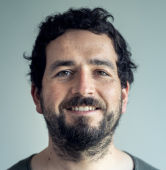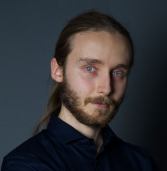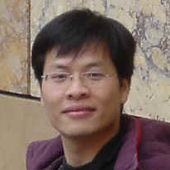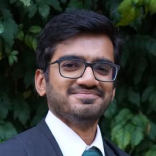|
|
|
Lectures and Keynotes > Day 4 - Control and PerceptionDay 4 - Control and Perception9:00-11:00: Lecture "Primers of Model-Based Soft Robot Control"- "Model-Based Sensing and Design Optimization for Soft Robotics" - Stefan Escaida NavarroAbstract: In this lecture, I will report on the work on model-based sensing for soft robots. Model-based sensing addresses the challenge of enabling tactile sensing and proprioception for soft robots in a principled way. Using inverse problem solving, the forces/deformations that best explain the observed sensor readings can be found. The first results were obtained with soft pads, which are passive devices. Air chambers are embedded in these devices and changes in volume or pressure are measured by pneumatic sensors. Forces magnitudes and deformations could be estimated using SOFA. However, for estimating contact location, machine learning had to be employed. Therefore, as a follow-up, a multi-modal sensing approach was proposed: contact location is obtained using soft capacitive touchpads and thus interactions can completely be handled by the numerical simulation. In recent works, it was studied how these approaches can be applied to actuated devices. We have found that these results can be applied to the development of anatomical soft robots, that is, novel medical phantoms having advanced functionality as well as multi-segment soft manipulators. Finally, I will talk about design optimization of soft robots with embedded sensors using SOFA and the challenges related to sim-to-real transfer.  Bio: Stefan is an Assistant Professor at Universidad de O'Higgins. He received his diploma in computer science (Dipl.-Informatiker) from Karlsruhe Institute of Technology (KIT), Germany in 2010. He obtained his PhD degree (Dr.-Ing.) from the same institution in 2016. He is passionate about tactile and proximity perception in robotics, with interests ranging from sensor design to the applications enabled by them. During his doctoral phase he researched on haptic object recognition and grasping as well as the technology and the applications for capacitive tactile proximity sensors, such as preshaping, collision avoidance and teleoperation. After his PhD, he was postdoctoral researcher at Inria Lille, where worked on model-based force and shape sensing for Soft Robotics. Since October 2022 he's an Assistant Professor at Universidad de O'Higgins, where he continues his research on sensing for Robotics, with a focus on Soft Robotics for medical applications, smart agriculture and visual arts.
- "Workspace Analysis" - Quentin PeyronAbstract: In this lecture, we will talk about the notion of workspace, which is essential to understand when controlling robots. The workspace is the set of end-effector positions or poses (including orientation) that can be reached. I will give an overview of the numerical methods that can be used to compute the workspace, and present their results for different soft robot architectures. An important part of this lecture will also concern the presence of singular and elastically unstable robot configurations, for which the robot loses degrees of freedom or exhibit sudden snapping behaviors. I will give an overview of known singularities and buckling phenomena in soft robotics, and how to predict and manage them.  Bio: Dr. Quentin Peyron is a research scientist at the INRIA institute, working with the DEFROST team. After obtaining an engineering diploma in mechatronics from INSA Strasbourg, and a master in robotics from the University of Strasbourg, he obtained a PhD in robotics from the University of Bourgogne Franche Comté. During his PhD, he worked in co-supervision with the ICube (Strasbourg) and FEMTO-ST (Besançon) laboratories on the modeling, analysis and design of slender and thin continuum robots for minimally invasive surgery. He also collaborated with the MSRL team of ETH Zürich on magnetic continuum robots. He was a Postdoctoral Fellow at the Continuum Robotics Lab of the University of Toronto from 2020 to 2021, where he worked on tendon-driven continuum robots. During his Post-Doc, he received the Post-Doctoral Fellowship Award from the University of Toronto. His research interests are the modeling, design, and control of continuum and soft robots, and the development of eco-designed soft robotics for industrial applications.
- "Model-Based Control" - Gang ZhengAbstract: Compared to classical rigid robots, soft robots are typically constructed from deformable materials, resulting in infinite degrees of freedom, which makes the control problem more challenging. Various modeling techniques, such as beam theory and the finite element method, have been utilized in the literature, leading to similar underactuated forms. Based on the deduced model, this lecture will present different control strategies to achieve the motion control objective of the soft manipulator.  Bio: Gang Zheng received the Bachelor and Master degrees in Communication and systems in 2001 and 2004, respectively, both from Wuhan University, China, and Ph.D. degree in Automatic control from ENSEA/Université de Cergy-Pontoise, Cergy, France, in November 2006. From December 2006 to December 2007, he held a Postdoctoral position in BiPop research team of INRIA Rhône-Alpes, Grenoble, France. From January 2008 to August 2008, he was Postdoctoral researcher in CASYS research team of LJK/CNRS, Université de Joseph Fourier. From September 2008 to August 2009, he was a Teacher-Researcher in ENSEA. He joined INRIA as a permanent researcher from September 2009. Gang Zheng is a senior member of IEEE.
11:30-12:30: Keynote "Learning full body deformation of soft robots using end-to-end models" - Thomas G. ThuruthelAbstract: Learning-based techniques are becoming increasingly popular for developing models of soft robots for control purposes. Typically, they involve developing a mapping from the control space to the task space using real-world data. However, there have been limited works on using learning-based approaches for fully-body modelling of soft robots. This talk presents some of the latest work on learning full-body deformation of soft robots for static and dynamic cases, including interactions with the external environment.  Bio: Dr. Thomas George Thuruthel is an Assistant Professor in the Department of Computer Science at University College London. He received his B.Tech. degree in Mechanical Engineering from the Indian Institute of Technology Hyderabad, India, in 2013, followed by a Master's degree in BioRobotics from Waseda University, Tokyo, Japan, in 2015, and a Ph.D. degree with Honors from Scuola Superiore Sant’Anna, Pisa, Italy. He served as a postdoctoral researcher at the University of Cambridge from 2019 to 2022. His research interests include modeling and control, dexterous manipulation, and soft sensing. Currently, he is focusing on the control of soft robots, design optimization of soft-bodied systems, development of novel soft sensors, and dexterous manipulation using visuo-tactile information.
|


